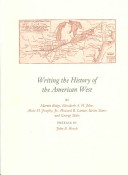In 1890 the Superintendent of the Census found it was no longer possible to draw a line to mark the frontier in the American West. Historian Frederick Jackson Turner used the occasion of that bureaucratic's announcement to undertake his analysis of the defining role that the frontier had played in the making of American society and institutions, in his famous paper "The Significance of the Frontier in American History" in 1893. A century later, the Turner thesis is being subjected to intense revision by scholars, many of whom view the history of the frontier and of the West through the prism of gender, race, ethnicity, and class, or from an environmental perspective. The contributors to this collection, which was derived from a 1991 symposium sponsored by the American Antiquarian Society, offer their views on the American West. Martin Ridge re-examines Turner's legacy in this time of revisionism; Elizabeth A.H. John draws attention to the rich ethnic and archival legacy of the Spanish Borderlands and urges that the region be fully incorporated "into this nation's knowledge of itself"; Alvin M. Josephy, Jr., provides a personal view of the continuity between the Old West and the New; Howard R.
Lamar acknowledges the diverse and often personal nature of the West and looks forward to an eventual synthesis of work old and new; Kevin Starr urges the incorporation of the urban dimensions of western history, the West's links with the rest of the Pacific Rim, and of the whole 20th century in a comprehensive view of the history of the West. The volume concludes with George Miles's presentation of a catalogue entitled "'Go west and grow up with the country': an exhibition of 19th century guides to the American West in the collections of the American Antiquarian society".
- ISBN10 0944026311
- ISBN13 9780944026311
- Publish Date March 1992
- Publish Status Transferred
- Publish Country US
- Imprint University of Virginia Press
- Format Paperback
- Pages 109
- Language English
